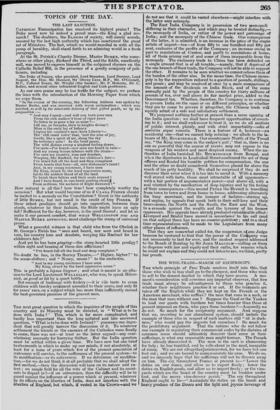INDIA.
THE next great question to which the inquiries of the people of this country and its Ministry must be directed, is " What is to be done with India ? " This, which is far more complicated, and hardly less important than the long agitated and late answered question, " 'What is to be done with Ireland? " possesses one ingre- dient that will greatly narrow the discussion of it. To whatever settlement the friends or the enemies of the Catholics were finally to come, there was not—at least so the latter, argued—any over- whelming necessity for hurrying thither. But the India question must be settled within a given time. We have now but one brief twelvemonth in which to make up our minds, if not absolutely, at least for a term of years which few of the present generation of statesmen will survive, to the sufferance of the present system—to its modification—or its subversion. If we determine on modifica- tion,—for we do not think it at all probable that we shall adopt the first method,—then the discussion will turn on its nature and ex- tent ; an ample field for all the wits of the Cabinet and its assist- ants to disport in !—if on subversion, then the difficulty will be to guard against the influence of a power which at present, whatever be its effects on the liberties of India, does not interfere with the liberties of England, but which, if vested in the Crown—and we do not see that it could be vested elsewhere—might interfere with the latter very seriously. The East India Company is in possession of two monopoli differing in their character, and which may be treated distinctly,— the monopoly of India, or rather of the power and patronage of India; and the monopoly of the Chinese trade. One consequence of the latter, it is admitted, is an increase in the price of the staple article of import—tea—of from fifty to one hundred and fifty per cent, exclusive of the profits of the Company; an increase owing in part to regulations at Canton, and partly to regulations at home, all of them arising out of and some of them inseparable from the monopoly. The exclusory trade to China has been defended on a single ground that is at all tenable,—namely, that if deprived of the one branch of their trade, the Company will not be able to support the other. It remains to be seen whether we cannot relieve them of the burden of the other also. In the mean time, the Chinese mono- poly is by the supposition reduced to a question of pounds, shillings, and pence ; and may be resolved at once by a mere comparison of the amount of the dividends on India Stock, and of the sums annually paid by the people of this country for thirty millions of pounds of tea, over and above its fair market price, added to the Government tax. Whether, therefore, the Company is to continue to govern India on the same or on different principles, or whether they are to cease to govern it altogether, the Chinese trade will equally admit of a safe and satisfactory settlement. We purposed nothing further at present than a mere opening of the India question : we shall have frequent opportunities of revert- ing to it ; and we shall endeavour to treat it, as we do all matters of public interest, plainly, and with strict impartiality—odio et aintatia mque remotis. There is a feature of it, however—an accidental one—that we cannot help noticing : we allude to the la- bours of Mr. BUCKINGHAM. Our countrymen North of the Tweed say,' " the King may come in the cadger's gait ;" that is, there is no one so powerful that the course of events may not expose to the weapons of his weakest and most despised enemy. When the au- thorities of India banished Mr. BUCKINGHAM from Bengal, and when the dignitaries in Leadenhall Street confirmed the act of their officers and flouted his humble petition for compensation, the one and the other no doubt considered themselves placed far above the reach of his petty hostility. We shall be surprised if they do not discover their error when it is too late to mend it. With a memory well stored with facts, those most intractable of all opponents— with a fair portion of argumentative power—and above all, with a zeal whetted by the recollection of deep injuries and by the feeling of their consequences—this second PETER the Hermit is travelling from town to town and from house to house, addressing alternately the busy merchant, and the lounger of fashion—stirring up, and urging, by appeals that speak both to their self-love and "their benevolence, the North and the South, the East and the West, to a crusade against the wealth and the tyranny of his former oppressors. His appeals have already produced considerable effect : Liverpool and Bristol have moved in accordance' to his call (and on that subject there has been no counter-petition) ; and in a short time representations will he made to the Legislature from many other places of influence.
That they are somewhat called for, the suspension oinne Judge because he ventured to hint that the power of the Cottpany was not necessarily to last for ever, and the modest request addressed to the Bench of Bombay by Sir JOHN MALCOLM—calling on them to dispense with law and equity and their oaths, for reasons which he could not explain and they could not listen to are, we think, pretty fair proofs.


















 Previous page
Previous page